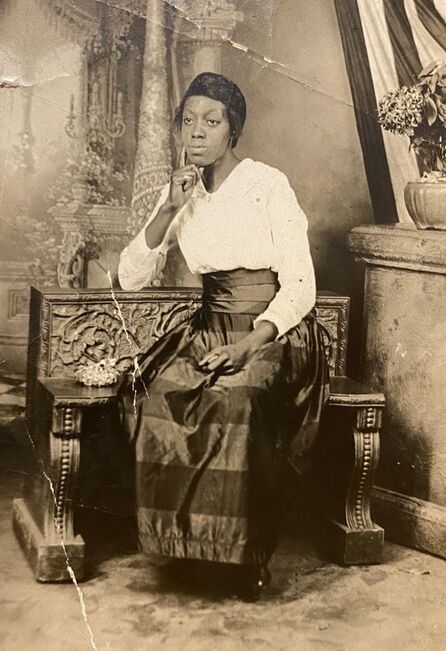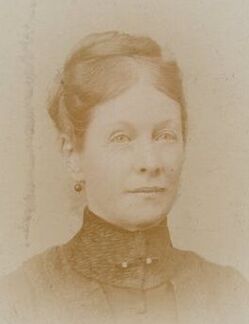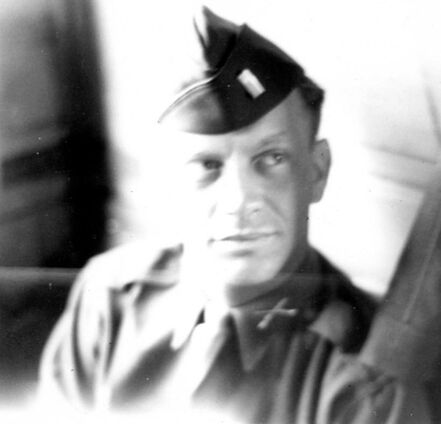 Katie Carter, the younger sister of George Carter and the grandmother of Jim Bannister. George Carter was lynched in Paris, Ky., in 1901. Photo provided by Jim's daughter, Cheryl. Katie Carter, the younger sister of George Carter and the grandmother of Jim Bannister. George Carter was lynched in Paris, Ky., in 1901. Photo provided by Jim's daughter, Cheryl. On February 23, 1900, Rep. George Henry White (R-N.C.), the sole Black U.S. lawmaker at the time, gave an impassioned speech on the House floor about the antilynching legislation he was proposing. The bill would make mob violence that resulted in the victim’s death a federal crime of treason to be tried in U.S. courts. White had felt compelled to act after witnessing the bloody Wilmington, N.C., race riot a little over a year before, during which a mob of white locals toppled the city’s multiracial government and ruthlessly murdered an estimated 60 innocent Black citizens. After White’s speech, his fellow congressmen applauded his words but failed to pass the bill out of committee. Thirty-five years after the Civil War, Southern devotion to states’ rights was still paramount. White called out some of his colleagues who had spoken against heinous lynchings in their own communities. In White’s view, these legislators would not countenance federal legislation because “this would not have accomplished the purpose of riveting public sentiment upon every colored man of the South as a rapist from whose brutal assaults every white woman must be protected.” [Washington Post, February 21, 2020] A year later, on February 11, 1901, a determined mob of local townsmen hung George Carter in front of the Bourbon County Courthouse in Paris, Ky. His crime? According to news reports: an attempted purse snatching. According to rumor and innuendo: rape.  My great-grandmother, Mary Lake Barnes Board. My great-grandmother, Mary Lake Barnes Board. The woman George Carter allegedly accosted was my great-grandmother, Mary Lake Board. The eight-year-old boy who identified Carter as his mother’s assailant was my maternal grandfather, William Lyons Board. There are reasons to question whether George Carter was indeed the man who assaulted my great-grandmother. There was no trial, no presentation of evidence. There was almost certainly no capital crime. In her book In the Courthouse’s Shadow: The Lynching of George Carter in Paris, Kentucky, Paris native Tessa Bishop Hoggard scrutinizes the contemporaneous documentation and then offers a riveting account of the lead-up to the encounter with my great-grandmother and its chilling aftermath. The hanging also plays a pivotal role in the novel I wrote about my grandfather, Next Train Out. Of course, no one in that Paris, Ky., mob was ever identified or arrested. No one was charged or convicted of murdering George Carter. There was no federal hate crime or antilynching law on the books, because Congress had failed to act the year before. It was not until 1920 that “Kentucky became the first southern state to pass an antilynching law.” [John D. Wright Jr., “Lexington’s Suppression of the 1920 Will Lockett Lynch Mob,” The Register of the Kentucky Historical Society 84, no. 3 (1986): 263-79.] This month, 122 years later, after 200 failed attempts, Congress finally succeeded in passing the Emmett Till Antilynching Act, named in honor of the 14-year-old boy who was lynched in Mississippi in 1955. After President Biden signs the bill into law, a lynching resulting in death or serious bodily injury can be prosecuted as a federal hate crime punishable by up to 30 years in prison. It’s too late for George Carter, of course, or for the estimated 2,000 people who were lynched in this country after White’s original bill failed. But perhaps it’s a sign that our nation’s citizens are finally ready to take some initial steps toward ensuring justice prevails when racial hate crimes are committed. Just last month a Georgia jury found the three white men involved in Ahmaud Arbery’s murder guilty of federal hate crimes. The next day the three Minneapolis police officers who remained inert as Derek Chauvin slowly killed George Floyd were all found guilty of violating Floyd’s civil rights. It may feel like way too little way too late, but perhaps we can sense a slight rebalancing of the scales of justice. Perhaps we are moving at a snail’s pace toward that more perfect union where all men and women truly are created equal. Despite current efforts in statehouses across the country to restrict discussions of our nation’s documented history relating to racial injustice and oppression, perhaps these concrete actions are signs of movement in the opposite direction, toward transparency and a more honest reckoning of our past. We all need to feel uncomfortable about the atrocities that have been committed in this nation to buttress unequal power structures. We need to feel shame. And then we need to take action to address the lingering institutions and sentiments that perpetuate these injustices. Rep. Bobby Rush, D-Ill, the longtime champion of the Emmett Till Antilynching Act, said after the bill passed: “Lynching is a longstanding and uniquely American weapon of racial terror that has for decades been used to maintain the white hierarchy…. [This bill] sends a clear and emphatic message that our nation will no longer ignore this shameful chapter of our history and that the full force of the U.S. federal government will always be brought to bear against those who commit this heinous act.” [NPR, March 7, 2022] Bill signedOn Tuesday, March 29, 2022, President Biden signed into law the Emmett Till Antilynching Act. Till’s cousin, Rev. Wheeler Parker Jr., the last living witness to his abduction, said in response, “Laws make you behave better, but they cannot legislate the heart.” Let’s hope the hearts of all Americans are slowly recognizing the injustices that have stained our nation since its inception. eventOn Saturday, March 26, 2022, Tessa Bishop Hoggard and I participated in a Zoom virtual conversation hosted by the Paris, Ky., Hopewell Museum. We discussed the 1901 lynching of George Carter and how that dark episode prompted both of us to write our books. Connecting with Tessa ultimately led to my friendship with George Carter’s great-nephew, Jim Bannister.
4 Comments
 Pink lady’s slipper in the Red River Gorge. Photo by Olive Ford. Pink lady’s slipper in the Red River Gorge. Photo by Olive Ford. Joe Ford, of Louisville, Ky., responds to Reunion on the Rocks with some reflections of his own. If you would like to submit a post to Clearing the Fog, please contact us here. It occurs to me that I spent my winter in three pursuits: 1. Contemplating, from an evolutionary standpoint, why my hair is migrating from the top of my head to my ears and nose. What’s up with that? 2. Worrying about spontaneous human combustion. It’s a thing, apparently. 3. Hmmm… ummm… wait, wait… uh, oh darn, I can’t remember. It will come back to me. Sallie’s recent post reminded me that, instead, I could have been stumbling along the trails in the Red River Gorge and adjacent Clifty Wilderness. My family has spent a lot of time there camping in the milder months, mostly at Koomer Ridge or Whittleton. In the winter we retreated to the cabins at Natural Bridge, snuggling up before the fireplace after a winter hike. Derby weekend was our favorite time to head to the hills: no school activities, no violin recitals, no social requirements. It was easy for us to get away, as it was for my daughter’s friends and their families who followed us down. Everyone brought something for communal use. Pity the newcomers who signed up to bring cups. You have not seen indecision until you’ve seen a newly environmentally conscious parent standing in Kroger trying to decide between the red plastic cups and the Styrofoam cups. (Will the other parents judge me? Will the kids ostracize my child? Where the hell are those tiny little paper Dixie cups?) Soon they would learn, as we had: bring all your mugs from home and take them back with you. Once a family from India was assigned to bring the makings of s’mores. You know, graham crackers, Hershey bars, marshmallows. Delivered as ordered: graham animal crackers, mini-bite Hershey bars, and tiny hot chocolate marshmallows. Derby weekend was also a perfect time to be in the woods: the wildflowers were out in droves, and our favorite trails sheltered their treasured jack-in-the-pulpits and pink lady slippers. And if you saw a yellow one, well, the angels must have noticed what a bad week you’d had. Perhaps Jim and Jeff and Sallie and Greg and Walter and Bob and Bob would let me tag along. I hope to have more time soon. As you may have surmised from my enumerated winter pursuits above, I am sort of on a glide path to retirement. Not quite 65, but I recently quit my long-time corporate jobs and took a pay cut to help with a small business run by my brother as he brought it out of the pandemic shutdown. For those readers contemplating a similar move, let me counsel you to learn from my mistakes (revealed in that little paragraph above). I am not a math or accounting major, so it took me by surprise when the seemingly innocuous idea of accepting a salary cut turned into less money actually being deposited in my bank account each week. I mean, who knew? So when I finally, gulp, step down to zero income and full retirement, maybe I can hike with you guys. I expect I’ll be feeling lost and confused. You, the experienced hikers and retirees, can nudge me in the right direction, down the trail and on through the next stage of life.  In June 1946, John C. “Pud” Goodlett travels third class from Bamberg to Le Havre before boarding a ship home. In June 1946, John C. “Pud” Goodlett travels third class from Bamberg to Le Havre before boarding a ship home. My father, the rule-follower. At least now I know where I get it. “It will always be a source of regret to me that I followed Army regulations and failed to keep a diary of my days in Europe from Jan 1945 to June 1946.” Pud wrote that in the Preface to the journal he started well after the war, in February 1953, while employed as a research associate at Harvard Forest in Petersham, Mass. Though this journal focuses on his efforts to complete his doctoral dissertation, his interactions with other scientists and their research projects, and his introduction to academic and work-life politics, he is nonetheless just a few years removed from his march across Europe as a lieutenant in Patton’s army. Every now and then, wartime memories would interrupt his typical journal remarks about New England weather or frost heaves, with no elaboration. The specific horrors or searing experiences that prompted a terse reference were not permitted to stain these pages. For example, here is how he opened his post on 31 March 1953: Eight years ago about this time I was crossing the Rhine at Mainz. This afternoon about 1600 the sun broke out and stayed until sunset. We’ve had about a week of lousy weather—rain or cool and cloudy. Rain gauge showed almost 3 in. for last week. Worcester had 8 in. rain in March—more than any March since 1936, the year of disastrous floods. Last weekend the Conn. and Saco Rivers were on the rampage. … After crossing the Rhine to Frankfurt, Pud and his unit would follow Germany’s 6th Infantry Division east to Mühlhausen, south to Erfurt, through the Thüringer Wald to the Danube at Regensburg, and eventually on to Austria. They encountered increasingly demoralized enemy forces and human atrocities unlike any the modern world had seen. My father witnessed all of this first-hand. As an intelligence staff officer and a battalion S2, Pud was responsible for relaying to his commander the threat that lay just ahead: the number of and preparation of the enemy forces, the terrain and battlefield conditions, and the risks to a successful completion of the mission. The accuracy of his assessment and the clarity of his communication could save—or cost—American lives. Amid the chaos of war, the Allied forces had one goal: the defeat of Hitler and the forces he had aligned behind the Nazis. The enemy was so clear, the purpose so important, that young American men, including members of my family, eagerly volunteered to fight, sometimes before they were of legal age to join the military. I recall this family history, of course, as Vladimir Putin sends Russian forces westward into Ukraine. Putin has his own reasons for this aggression, claiming, falsely, that the democratically elected Ukrainian government grabbed power illegitimately. Putin wants us to believe he is fighting the Nazis--“like 80 years ago.” He is not. But he believes that he can win support among Russian people if he resurrects the horror inflicted on millions of Russians during the Second World War. The Nazis were the clear enemy then, so they will be a convenient enemy now. We have all seen the rising influence of Nazi sympathies in recent years. It is a cancer that seems to metastasize unchecked in dim corners of civilized society. I expect Ukraine, like most Western countries, has some number of Nazi sympathizers. It is not, however, a nation ruled by Nazis. Our parents and grandparents fought the evil that was Nazism. As did the parents and grandparents of Russian citizens. And Ukrainian citizens. Putin’s forces today are not fighting Nazism. They have been conscripted to fight Putin’s war to realize his fever dream of an expanded Russian state. It is Putin who is using Nazi tactics like disinformation and a nationalistic love for the motherland to further his own totalitarian ambitions. We see this clearly. We ache for the Ukrainian and the Russian citizens; the refugees and the nations that have opened their arms to them; the Russian soldiers who are being sent to fight their neighbors and their family members; the Ukrainian forces that are withstanding the assault of a larger, better equipped opponent; the Ukrainian citizens who are fighting back in the streets; the Ukrainian officials who are standing strong in the face of mortal threat and the physical destruction of their cities and their homes. Experts tell us this tragedy is still in its opening act. It’s hard to know how it will play out. We can only hope, once again, that the rest of the world can find the courage to stop a madman. |
Details
Archives
June 2023
Categories
All
|


 RSS Feed
RSS Feed